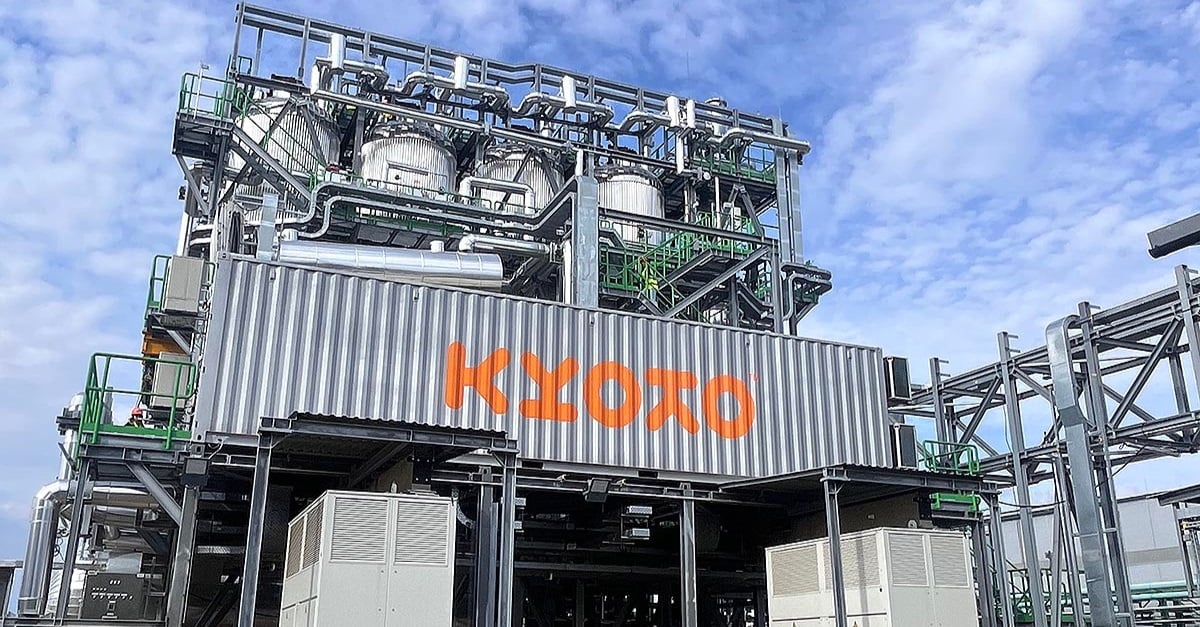Business
Kyoto Group Launches Thermal Energy Storage System in Hungary

Kyoto Group has unveiled a significant advancement in sustainable energy use with the launch of its thermal energy storage system at the KALL Ingredients corn processing plant in Tiszapüspöki, Hungary. Announced on 9 October 2023, this project marks the second deployment of Kyoto Group’s innovative Heatcube technology, which is designed to replace natural gas usage in industrial applications.
The 56MWh Heatcube system will provide over 30GWh of process heat annually to the facility, significantly reducing its reliance on fossil fuels and lowering carbon emissions. The Heatcube operates with a charging capacity ranging from 10-20MW and a discharge capacity of up to 14MW. This technology can store energy up to 104MWh and release steam at temperatures between 150 and 300 degrees Celsius.
Kyoto Group’s technology utilizes resistive heaters that convert electricity into heat, which is then stored in molten salt. This method ensures that energy can be released when required, providing a reliable source of industrial heat. The Heatcube is built for a lifespan exceeding 25 years and boasts a round-trip efficiency of over 93%, with a usable energy storage density of approximately 280kWh/m2.
Partnerships and Business Model
This project was made possible through collaborations with Kyoto Group’s majority investor, Kyotherm, and its energy trading partner, minority investor Energiabörze, a local trader and aggregator based in Hungary. KALL Ingredients has opted for a 15-year heat-as-a-service agreement, allowing the company to benefit from the Heatcube technology without the upfront costs of purchasing the system outright.
The Heatcube will also participate in flexibility markets, ensuring that it charges with renewable energy whenever available. This approach not only enhances the sustainability of KALL Ingredients’ operations but also aligns with broader efforts to decarbonize industrial processes.
Challenges and Market Landscape
Thermal energy storage technology is gaining traction as a viable solution for decarbonizing hard-to-abate emissions in industrial settings. Kyoto Group is one of several companies striving to commercialize these technologies. Nevertheless, the sector faces challenges, including maintaining high-quality, consistent heat at elevated temperatures and ensuring a seamless transition for end-users.
Kyoto Group’s first deployment occurred in Denmark earlier in 2023. Other notable players in this field include Israeli companies and American firms focusing on similar technologies, as well as Scandinavian providers like the Danish molten salt storage company. Additionally, Finnish companies are exploring lower temperature thermal storage solutions for domestic district heating, exemplified by their innovative ‘Sand Battery’ technology.
As industries worldwide seek sustainable alternatives to traditional fossil fuels, initiatives like the one launched by Kyoto Group could play a pivotal role in reshaping energy consumption in the industrial sector. The successful implementation of the Heatcube at KALL Ingredients may serve as a model for future projects across Europe and beyond.
-

 Health3 months ago
Health3 months agoNeurologist Warns Excessive Use of Supplements Can Harm Brain
-

 Health3 months ago
Health3 months agoFiona Phillips’ Husband Shares Heartfelt Update on Her Alzheimer’s Journey
-

 Science2 months ago
Science2 months agoBrian Cox Addresses Claims of Alien Probe in 3I/ATLAS Discovery
-

 Science2 months ago
Science2 months agoNASA Investigates Unusual Comet 3I/ATLAS; New Findings Emerge
-

 Science1 month ago
Science1 month agoScientists Examine 3I/ATLAS: Alien Artifact or Cosmic Oddity?
-

 Entertainment5 months ago
Entertainment5 months agoKerry Katona Discusses Future Baby Plans and Brian McFadden’s Wedding
-

 Science1 month ago
Science1 month agoNASA Investigates Speedy Object 3I/ATLAS, Sparking Speculation
-

 Entertainment4 months ago
Entertainment4 months agoEmmerdale Faces Tension as Dylan and April’s Lives Hang in the Balance
-

 World3 months ago
World3 months agoCole Palmer’s Cryptic Message to Kobbie Mainoo Following Loan Talks
-

 Science1 month ago
Science1 month agoNASA Scientists Explore Origins of 3I/ATLAS, a Fast-Moving Visitor
-

 Entertainment2 months ago
Entertainment2 months agoLewis Cope Addresses Accusations of Dance Training Advantage
-

 Entertainment3 months ago
Entertainment3 months agoMajor Cast Changes at Coronation Street: Exits and Returns in 2025









